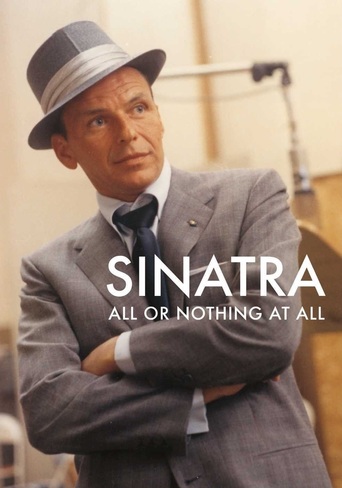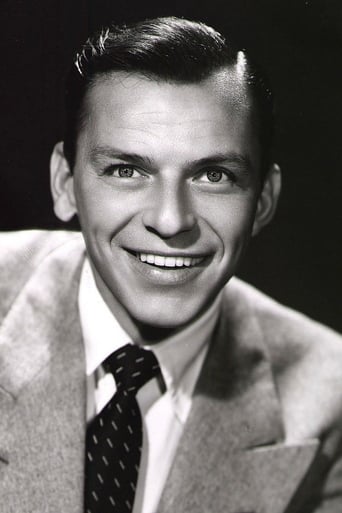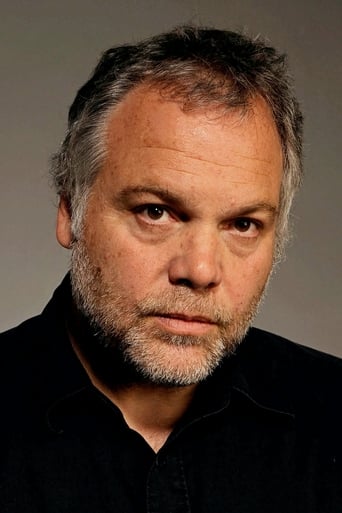

Sinatra: All or Nothing at All (2015)
An up-close and personal examination of the life, music and career of the legendary entertainer. Told in his own words from hours of archived interviews, along with commentary from those closest to him, the documentary weaves the music and images from Sinatra’s life together with rarely seen footage of his famous 1971 “Retirement Concert” in Los Angeles. The film’s narrative is shaped by Sinatra’s song choices for that concert, which Gibney interprets as the singer’s personal guide through his own life.
Watch Trailer
Cast
Reviews
i must have seen a different film!!
Did you people see the same film I saw?
Yo, there's no way for me to review this film without saying, take your *insert ethnicity + "ass" here* to see this film,like now. You have to see it in order to know what you're really messing with.
Through painfully honest and emotional moments, the movie becomes irresistibly relatable
This series of four hourly programmes took us through the long and varied life of Francis Albert Sinatra, combining archive footage with contemporary voice-overs to give a full cradle-to-grave account of one of the twentieth century's greatest singers. I enjoyed the ride albeit with a number of major caveats.Undoubtedly the kid from Hoboken was a complex character, a loved and devoted father to his children, who was a man's man happy to lead the Rat Pack and also a serial womaniser (Sinatra's Greatest Misses, you could say), a conscientious, charitable fund-raiser who never lived down his connections to the mob, a challenger of racial segregation who told on-stage off-colour (no pun intended) jokes at the expense of his friend Sammy Davis Jr and a registered Democrat and supporter of John F Kennedy who later flipped and became friends with the later disgraced Richard Nixon and his Vice President Spiro Agnew. In and out of style and popularity, he ended up being a towering personality in the entertainment industry making some of the greatest records of his time as well as some, though not as many, terrific movies. The series takes a chronological look at the man's life and times, using as its reference point his first, of many, as it turned out, retirement concerts, filmed in 1971 when he clearly was still at the height of his powers, although the idea of interspersing the songs into the narrative to effectively tell his story lost its way somewhat. I could also have done without the endless eulogising of thankfully off-screen so-called experts making ever grander claims of him, far better to let the viewer judge by what they see than be egged on by their endless hyperbole.I would also have preferred a bit more focus on his hit and miss movie career, with no reference at all to his superb performances in, for example "The Man With The Golden Arm", the classic "The Manchurian Candidate" (which is only present in a clever-clever link to the JFK assassination), his hit musicals "Guys and Dolls", "Pal Joey" or "High Society" or even his series of superior hard-edged detective thrillers of the late 60's like "The Detective" and "Tony Rome" these latter made when his old buddy Dean Martin was half-heartedly and self-demeaningly camping it up in his Matt Helm films. In fact there's surprisingly little coverage at all of his relationships with Martin and the rest of his Rat Pack buddies at all, (Shirley MacLaine doesn't get a look-in) and you'd have thought the well-known clip of his role in bring Dean and Jerry Lewis together after years of estrangement might have been worthy of inclusion.Much is made of course of his relationships with his women, particularly Ava Gardner who gave him a taste of his own mistreating medicine and the youthful Mia Farrow who soon resisted his latter-day controlling tendencies while his poorly-treated first wife Nancy is a running presence in the story particularly through the references to his children. There's also no allusion at all to his daughter Nancy's pop success in the 60's or much time given to his last wife Barbara Marx or indeed his death, funeral and artistic legacy.I'm no Sinatra completist but I also noticed some major omissions in the songs which otherwise pepper the soundtrack, like "Three Coins In The Fountain", "All The Way", "My Kind Of Town" and his surprise mid-60's number 1's "Strangers In The Night" (which he hated) and his duet with Nancy "Something Stupid". In the end, I came to the conclusion that this man's life was too big for this show's allocated time, indeed it could have run to twice the length and been much more detailed, cohesive and interesting accordingly. Undoubtedly though, Frank Sinatra is a difficult man to pin down or categorise and I think in this series, the prey eludes his hunters. What is beyond doubt is the greatness of his singing as shown in several concert and TV clips although the funniest thing you'll ever see him in is his unintentionally hilarious team-up in powder-blue Austin Powers chiffon with the then hit group the 5th Dimension in a groovy late 60's TV clip.In conclusion then I found this a muddled, inconclusive life of Frank, very good in parts, weak in others, a bit like the man himself I suppose, but I believe in truth he deserved a better biographical tribute than this in the final summing-up.
SINATRA - ALL OR NOTHING AT ALL cannot be viewed as anything less than a highly comprehensive biography of the legendary actor/singer. Through four hour-long episodes, director Alex Gibney traces his life from his humble origins in Hoboken, New Jersey, to his radio and film stardom, his abrupt decline in the early Fifties, and his return to enduring stardom once he had signed for Capitol Records and started collaborating with the conductor Nelson Riddle.Although liberally illustrated with reminiscences from members of his family, coupled with archive recordings of "Ol' Blue Eyes" being interviewed on television on radio, and readings of printed autobiographies by Ava Gardner, there are no talking heads appearing on screen. Instead, director Gibney uses archive footage, photographs and specially-shot material, with the reminiscences in sound only. This gives the documentary a unique narrative fluidity that Gibney sustains throughout the lengthy running-time.The central conceit was a good one - using Sinatra's retirement concert in 1971 as a basis, where he sang a series of standards that chronicled his life up to then - Gibney traced the singer's life through the songs. Each one of them were heard once a particular period of his life had concluded. Hence we heard "My Way" right at he end when Sinatra had decided to "finally" retire, having ostensibly fulfilled everything he wanted. The fact that he made a comeback three years later was beside the point.Yet still we are left unsatisfied as to where the director's point of view actually lies. There are certain aspects of Sinatra's life that are either sketchily told or omitted altogether; we hear nothing of his nefarious antics in the early Sixties where JFK and Marilyn Monroe were concerned. Nor do we really discover much about his Mafia connections, except to learn that he enjoyed hob-nobbing with those in power. At one point the documentary refers to his ventures as an entrepreneur, as he founded his own airline (among other things), but that strand is subsequently ignored. We do not know how successful the singer was as a business person.Although the program justifiably makes much of Sinatra's god-given talent as a singer, he nonetheless comes across as a distinctly unsavory personality. He treated two of his four wives extremely badly - only Ava Gardner could really stand up to him; and he seems to have assumed that any woman he encountered would want to go to bed with him. An inveterate social climber, he spent much time and energy helping JFK win his presidential campaign of 1960; but when the Kennedys dropped him - on account of his connections with Mafia boss Sam Giancana - Sinatra transferred his loyalties to the Republican cause. In later life he came out as a supporter of Nixon and Reagan. He obviously did not like to be crossed; there were several instances of him replying to someone with a mouthful of abuse.The interviewees worked hard to foreground his qualities - his enduring commitment to the cause of anti-racism, his generosity with underprivileged children - but we still got the sense that he was not undertaking them out of altruism. So long as he obtained a good press as a result, then he was prepared to continue. Perhaps it's best sometimes that we do not know the intimate details of an icon's personality, as it tends to knock them down from the imaginative pedestal on which we place them.
This documentary was absolutely fabulous. Sinatra has always been my favorite, as his music is what I was raised on. I can openly admit though, that I only knew bits and pieces about his life before watching the documentary. I feel so informed after having watched hours about the man's life, and I greatly appreciate that the documentary included high points as well as low points. To know a person, you have to know all aspects of his/her personality, and I think that this documentary did a wonderful job of trying to cover so much material in only a few hours.I would definitely recommend watching this documentary if you want to learn a little bit more about Ol' Blue Eyes and the fantastic work that he accomplished in his lifetime!
The big question about this tele-biography was whether it would be a balanced overview of Frank Sinatra and his career, or just a fawning snow job.Now in me, you have a person who has, I think, a somewhat balanced view of Sinatra. I neither love nor hate him. I have all of his Reprise studio recordings and many of his Capitol albums the good, the bad, and the ugly. And make no mistake, for a while in the early Reprise years many of Sinatra's recordings are probably the best versions of those songs – both in terms of his vocals and the arrangements – ever recorded. His concept albums for Capitol were groundbreaking. On the other hand, during the Reprise years you have recordings such as "Everybody's Twistin'" and "Life's A Trippy Thing". And, since Frank was totally in control during the Reprise years, there was no one else to blame. I look at his performance in "The Joker's Wild" and can't think of many actors who have ever turned in a better performance. And then there were some of the later films when he just didn't seem to care much. He was a flop on early television, but his 1960s specials were "cherce". So, I can admire much of what Frank Sinatra accomplished. He made a difference in popular music. But when it comes to the kind of man he was, well...my 100th birthday gift is to not finish that sentence.Some of what is said in the program doesn't seem to match with accounts which have been presented in the past. For example, in talking about the Capitol years they indicate Sinatra was in total control. Really? Then why quit Capitol to form Reprise, which at the time he said gave him artistic freedom? Where is the story of "dropping" Peter Lawford for the Kennedy incident? Dropping Joey Bishop? Having a long-term falling out with Dean Martin? Oh, conveniently omitted. The whole mob issue is brought up, but sort of dismissed as the mob did it and the Kennedy's did it, but Sinatra and his friends did everything out of the goodness of their hearts. And, in my view, far too much credit is given to Sinatra and friends for the election of John Kennedy.I didn't have high hopes for this television broadcast when I learned that it was produced by Frank Sinatra Enterprises. Much of the story here is told by Frank himself (in old interviews) and Nancy Sinatra and Frank Jr. After all, Frank thought he was wonderful, Nancy always fawned over her father, and, while Frank Jr. is a bit more balanced, it's almost always pretty positive. Even when the criticism during the war years is brought up (for example), it's within the context of how unfair some people were being to Sinatra. So, make no mistake, this is no penetrating, balanced biography. It should have been entitled "A Love Letter To Frank Sinatra".That's not to say it doesn't have something worthwhile of your time. You'll see film here you will probably never see again. It's comprehensive, if not objective. It's almost as if Sinatra was the only singer, the only actor, the only nightclub performer. He was big, but he was not alone. There was Cole, Crosby, Como, and many more. Frankly, the program couldn't have been more positive toward Sinatra if Sinatra had written it himself.Well, happy birthday, Mr. Sinatra. Your bio reminded me of all the reasons I admired so much of your work...and some of the reasons I didn't really like you as a person. I guess that's a very special way of appreciating you -- it's not easy to dislike someone personally, but buy almost all of their albums, watch all of their television specials, and go see most of their movies. Yup, you were very a very talented man.


